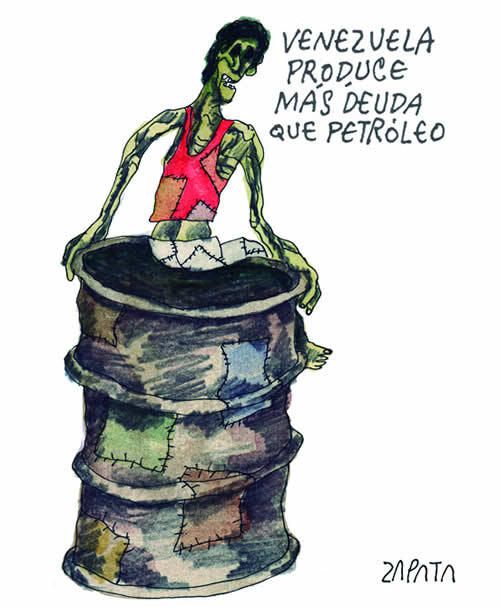Mélenchonisme tropical : Une agence de notation Chinoise lâche Maduro , l'UBU Moustachien de Caracas
Publié le 13 Novembre 2017
En fait cette kleptocratie pétrolière est incapable de trouver de nouveaux moteurs pour générer des richesses : 2. Venezuela lacks the ability to create wealth on its own while debt repayment sources are highly fragile, thus a low solvency
http://en.dagongcrg.com/index.php?m=content&c=index&a=show&catid=88&id=432
发布时间:2017-11-07 10:50:10 点击: 74
Dagong Global Credit Rating Co., Ltd. (hereinafter referred to as “Dagong”) has decided to place the sovereign credit rating of the Bolivarian Republic of Venezuela (hereafter referred to as Venezuela) on the list of negative reviews. On November 2 local time, Venezuela announced to restructure its total external debt, which indicates that facing the continuing deterioration of its domestic economy and government finance, as well as pressure from low solvency in local and foreign currency, the Venezuelan government demonstrated an increased unwillingness to repay its debt, thus growing default risks concerning its 183-million USD debt maturing on November 7 and other maturing debts. Specific reasons are set out as below:
1. The bleak prospect of debt restructuring causes considerable uncertainty as to whether the Venezuelan government can repay its maturing debts, thus resulting in high default risks.
Firstly, up until now, Venezuela’s international reserves coverage on total external debt has been around 10%. It is projected that by June 2018, the Venezuelan government and the state-owned petroleum company’s principal and interests on maturing debt will make up 21.0% and 10.5% of the international reserves, respectively. Though international reserves can cover maturing debt in the near term, they ultimately cannot cover long-term debt.
Moreover, following the Venezuelan government’s announcement on November 2 that it would restructure its total external debt, a panel was set up immediately; yet nevertheless, facing the 183-million USD debt maturing on November 7 as well as other debts maturing in the following months, the Venezuelan government has not displayed its willingness to repay the existing debt. Before opening the negotiation over debt restructuring and reaching an agreement, there exists considerable uncertainty as to whether Venezuelan government can repay debt as scheduled or not.
Last but not least, around 60% of those holding Venezuela’s treasuries are Americans, although America’s financial sanctions against Venezuela are still in place. Therefore, it remains difficult to restructure debts held by American creditors while refinancing channels are limited. As far as non-American creditors are concerned, Venezuela sees large-scale debt extension, so it is challenging to predict the future concerning Venezuela seeking refinancing from non-American creditors and the outcome of debt restructuring, thus the resulting uncertainty over future negotiations on debt restructuring. That being said, the short term will see considerable default risks.
2. Venezuela lacks the ability to create wealth on its own while debt repayment sources are highly fragile, thus a low solvency.
Since oil prices plummeted at the year-end of 2014, Venezuela saw a sharp economic recession, and ongoing hyperinflation, which caused a substantial drop in financial revenues and undercut its wealth creation capabilities. Facing a huge deficit and pressure from maturing debt repayment, due to the fact that relatively large government assets cannot act as a reliable repayment source due to weaker liquidity and the understanding that debt financing cannot continue owing to high costs and limited channels, the Venezuelan government depends heavily on currency issuance and debt repayment sources are vulnerable.
At the same time, due to dwindling international reserves and tremendous pressure of local currency depreciation, the government faces significant risks in repaying external debt. The year-end of 2016 saw Venezuela’s international reserves fall to 11 billion USD, which are forecasted to keep falling in 2017 and 2018. International reserves coverage will only be 37.3% and 37.7% respectively, which by no means guarantees repayment to external debt. That, coupled with the pressure of local currency devaluation due to money issuance, incurs serious risks against the country’s external debt.
Dagong will continue following any changes to Venezuela’s sovereign credit risks and adjust its credit rating accordingly

/image%2F1488575%2F20200906%2Fob_f39dc2_image001.jpg)
